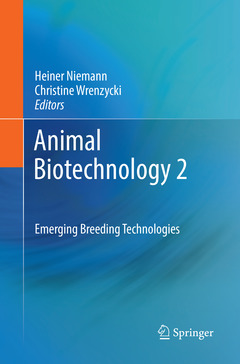Description
Animal Biotechnology 2, Softcover reprint of the original 1st ed. 2018
Emerging Breeding Technologies
Coordinators: Niemann Heiner, Wrenzycki Christine
Language: English
Subjects for Animal Biotechnology 2:
Animal Biotechnology 2
Publication date: 01-2019
Support: Print on demand
Publication date: 01-2019
Support: Print on demand
Animal Biotechnology 2
Publication date: 08-2018
Support: Print on demand
Publication date: 08-2018
Support: Print on demand
Description
/li>Contents
/li>Biography
/li>Comment
/li>
This two-volume textbook provides a comprehensive overview on the broad field of Animal Biotechnology with a special focus on livestock reproduction and breeding. The reader will be introduced to a variety of state-of-the-art technologies and emerging genetic tools and their applications in animal production. Also, ethics and legal aspects of animal biotechnology will be discussed and new trends and developments in the field will be critically assessed. The two-volume work is a must-have for graduate students, advanced undergraduates and researchers in the field of veterinary medicine, genetics and animal biotechnology.
This second volume is dedicated to genetic tools in animal biotechnology such as somatic cloning, transgenic technologies and the application of stem cells in livestock breeding. Also, ethics and legal aspects are discussed.
1. Somatic cloning of livestock by Somatic Cell Nuclear Transfer
K. Bondioli
2. Commercial Applications of SCNT in Livestock
M. Walton
3. Epigenetic features of animal biotechnologies
N. Beaujean
4. Current status of genomic maps, genomic selection/GBV in livestock
A. Blasco and R.N. Pena
5. Embryo Biopsies for Genomic Selection
E. Mullaart and D. Wells
6. Production of transgenic livestock – Overview of transgenic technologies
G. Laible
B. Petersen
8. Regulatory dysfunction inhibits the development and application of Transgenic Livestock for use in Agriculture
J. Murray and E. Maga
9. Genetically engineered large animals in biomedicine
E. Wolf, A. Kind, B. Aigner, A. Schnieke
10. Stem cells and cell conversion in livestock
F. Gandolfi and T. Brevini
11. The Legal Governance of Animal Biotechnologies
N. Hoppe
12. Ethical aspects of animal biotechnology
D. Lanzerath
13. Public perception of animal biotechnology
A. van Eenennaam and A. Young
Heiner Niemann is the Head of the Institute of Farm Animal Genetics in Mariensee and a Professor for Reproductive Biotechnology at the Veterinary University in Hannover and Honorary Professor at the Hannover Medical University (MHH). His group has made pioneering contributions to the the field of Animal Biotechnology, with emphasis on early embryo development, epigenetic reprogramming, transgenesis and genome editing. He has supervised >100 graduate and PhD students, published > 400 peer reviewed papers and has given numerous lectures around the globe. He received several awards, including most recently the Pioneer Award of the IETS (International Embryo Technology Society) and the Herrmann von Nathusius Medal from the German Society of Animal Production.
Christine Wrenzycki holds a position as full professor at the Clinic for Veterinary Obstetrics, Gynecology and Andrology, Faculty of Veterinary Medicine, Justus-Liebig-University in Giessen and is Head of the Chair for Molecular Reproductive Medicine. She is academic editor of PlosOne and associate editor of BMC Developmental Biology and has published more than 150 peer reviewed papers listed in WoS. She is supervising a group of about 10 doctoral students and one postdoc. She has been the President of the International Embryo Technology Society (IETS) and is currently the President of the German Society of Reproductive Medicine (DGRM).
\Within the field of reproductive biotechnologies, her main research topics are related to the molecular regulation of preimplantation embryonic development, e.g. effect of different protocols for in vitro maturation on mRNA and protein expression patterns in bovine cumulus-oocyte-complexes and subsequent developmental competence as well as to the epigenetic reprogramming during early embryonic development.
Discusses transgenic technologies in livestock breeding
Critically reviews animal biotechnology in regard of ethics and legal aspects
Volume 1 and Volume 2 together provide a comprehensive overview on technologies and developments in the field of animal biotechnology
© 2024 LAVOISIER S.A.S.
These books may interest you

Advances in Animal Biotechnology 158.24 €



